This subject is a bit of an SEO joke since Google doesn’t use any meta tags for ranking purposes, so in some respects optimizing these meta tags is a waste of time.
WordPress SEO Tutorial updated December 2019
That being said lots of SEO consultants tout various services to optimize the keywords meta tags and description meta tags and so I have to cover it here so at least others know not to waste money on SEO services that indicate they will improve your Google rankings using meta tags!
In the last article in my WordPress SEO Tutorial series I covered WordPress SEO Tutorial Title Tag, now I’ll cover the description meta tag and the keywords meta tag with relevance to WordPress.
You can read a general SEO tutorial on meta tags optimization at SEO Meta Tags Optimization.
Lets Have Some Fun With Meta Tags :)
Quite sometime ago search engines like Google were VERY dumb, today they are just slow :) When Google etc… was very dumb the search engine algorithms of the day couldn’t even determine what a page was about from the text content on the page or the links to a page (they were really dumb).
Some bright spark came up with the idea of meta tags that would be hidden from the website visitors, but could be used by search engines to rank websites in their search engines.
Meta tags were a great idea IF you believe every website owner would only list relevant keywords within their meta tags: AKA porn websites using high traffic keywords like Disney for high traffic to their porn sites would never happen, it’s immoral!
What were they thinking!
Almost two decades later we now have search engines that are no longer very dumb, they can read almost all the content of a webpage (they have problems with few things like javascript) and even take backlinks, social media activity, page speed metrics into account when ranking web pages.
Since the search engines no longer need the hidden meta tag content to determine how a page should be ranked in their search engines and more importantly a small percentage (LOL) of webmasters abuse the content of meta tags, the vast majority of search engines (including all that send reasonable traffic) no longer use meta tags for ranking purposes (they are ignored for ranking purposes).
For this reason you can safely not include a meta description tag or meta key tag on a webpage since it will not have a negative impact on the pages direct rankings.
Note: I’ve added a meta description tag to this article, but not a keywords meta tag.
It’s quite hard to generate meta tags out of the box with WordPress, the vast majority of WordPress themes don’t include them. Take into account if you install a WordPress plugin to include meta tags always double check the actual HTML code (view it’s source) to make sure you do NOT have duplicate meta tags.
Most WordPress SEO Plugin developers like the popular “All In One SEO Pack Plugin” and “Yoast WordPress SEO Plugin” include meta tags and they assume there aren’t other sources of meta tags (added my a theme or another plugin for example). So always double check for duplicates.
Should WordPress Users Care About Description Meta Tag?
The meta description tag does still have a potential ‘SEO’ use since Google will sometimes use the content of the meta description tag as the description for a Google SERP.
The Meta Description Tag added via the Stallion WordPress SEO Plugin matches the description Google is using for the “SEO Tutorial” Search.
A specific description can be more enticing vs a random snippet chosen by Google.
Again this does NOT have any impact on where in a SERP a page will land, however if the description is more enticing to a potential visitor than a random description from a webpage then it could result in a higher click through traffic from Google.
Your not going to get better rankings, but you might get more clicks with the current rankings. Consider the meta description tag as ad copy, this is where you try to convince a Google user your webpage at number 3 in a SERP is a better choice than the results above it.
Should WordPress Users Care About Keywords Meta Tag?
Google completely ignores the keywords meta tag, it has ZERO ranking value. Since it has no value, you should NOT include the keywords meta tags on your WordPress site.
Not that many years ago all the major WordPress SEO plugins like Yoast SEO and All In One SEO included the meta keywords tag as an option, this was despite the fact Google has NEVER used the meta keywords tag as part of their organic search engine ranking algorithm.
Google was never that dumb, Google used PageRank as it’s unique selling point.
As I update this article in December 2019, the goods news is most WordPress SEO plugin developers have finally clicked on the meta keywords tag is ignored by Google and they’ve dropped it from their plugins. Yeah.
WordPress SEO Meta Tags Optimization
If you plan to create unique description meta tags for WordPress Posts etc… see the meta description tag as an ad, if you are good at writing ads you might find a well crafted meta description tag could result in a higher click thru rate from Google etc…
If you don’t include a meta description tag Google etc… will still generate a SERPs description for your pages based on what Google thinks is the best description from the content on the page. Google tends to find content from a page that includes the phrase searched for and uses it for the SERPs description.
There are many more meta tags in existence, but the majority of them have no value for WordPress blogs and none of them increase a webpages rankings in a search engine.
There are robots meta tags that can block a pages spidering/indexing and useful social media meta tags, if you’d like to know about these please see Meta Tags Optimization Tutorial.
David Law

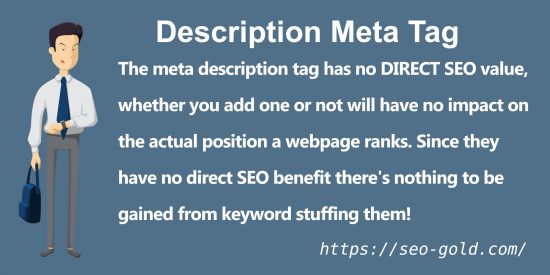
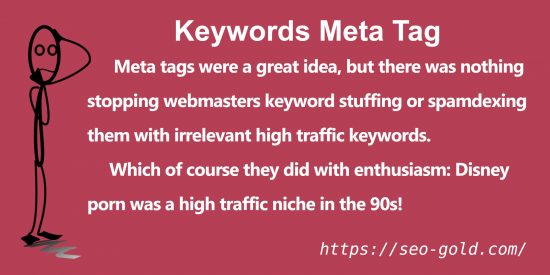
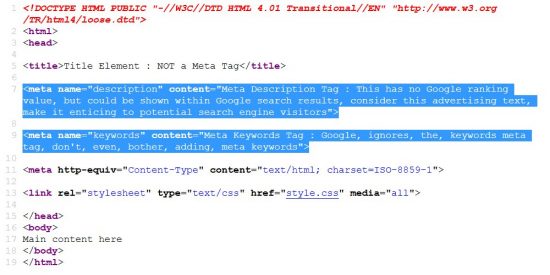
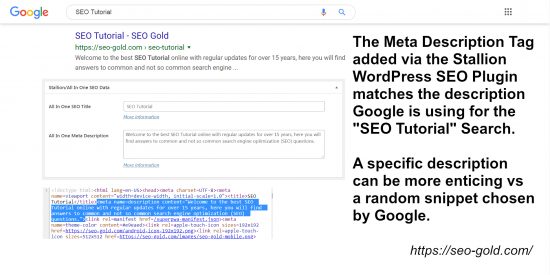
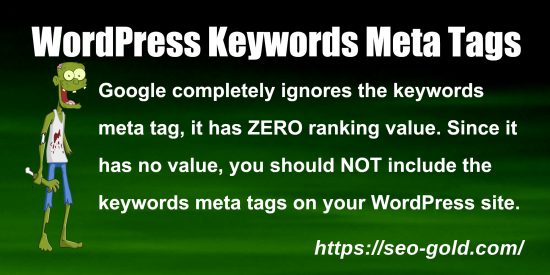


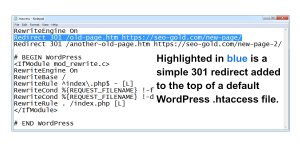



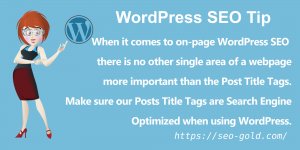


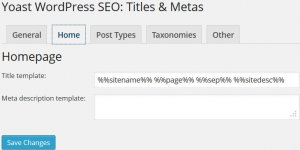
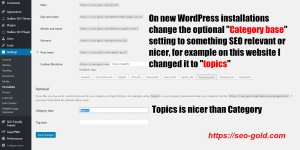

I went through Google meta tags help and they said it’s good way to index your page. But here you are saying different things. I am confused. :(
Google meta tags help would be here right: https://support.google.com/webmasters/answer/79812?hl=en
Note: Google does not list the keywords meta tag as one they use.
The only meta tags that’s got any value that might get you a little more traffic from Google is the description meta tag, BUT this tag does NOT increase rankings, no meta tag increases rankings in Google.
From Google about the description meta tag:
“This tag provides a short description of the page. In some situations this description is used as a part of the snippet shown in the search results”
This means when a Google search results shows your page at number 3 say for a search IF you’ve wrote a compelling description that is more likely to generate a click (think of a well written advert) than a random snippet of text from the page then you might get more traffic (more people click your link rather than those at 1, 2, 4, 5….. What it won’t do is increase that pages ranking, no matter what you add to that meta tag it isn’t going to change it’s actual ranking.
In my WordPress SEO theme I’ve set it up so the meta tag is either the title of the page or if a page has an excerpt (WordPress posts and pages) it will use the excerpt. If you haven’t written an excerpt it uses the automated excerpt.
So meta tags have no ranking value.
David
So if I understand it correctly, I don’t need to use SEO plugins like “All In One SEO Pack” in your AdSense ready themes because you already have it covered in how you designed the themes?
Let me get this straight you are saying that if you have targeted key terms in your title tag that match terms in your meta description tag as well that this won’t increase your SEO ranking in Google?
I disagree, especially for local search marketing. If you are a local business specializing in say the Louisville, KY area. Adding the term Louisville to your title tag and meta description tag will help smaller businesses gain an advantage in search engine rankings where they may have been pushed out by larger companies that don’t focus just on local areas.
Your right Steven…
I know that nobody, except perhaps the search engines, fully realize the targeted key terms influence in search results, but I’m sure they somehow affect a site’s web presence.
Question:
Is there a way to see how the pages that have been indexed are ranked without having to type it in at Google and then start searching.
I am confused too Google says meta tags and sitemaps help index our sites. Lets not forget the other tags like robot and Google verification tag. How do I tell if I have meta tag package installed in WordPress theme ?
No meta tags have SEO RANKING value in Google.
SEO Gold Title Tag
The title element (the title of a page) isn’t a tag, it isn’t a meta tag (amateur SEO’s have confused the webmaster community by calling it the title tag, it’s not a flipping tag, it’s an element).
The title element is probably the most important SEO factor on a page.
Back to actual meta tags which have zero ranking value in Google.
This is not saying some meta tags have no value or use, but they will not result in a page that’s say ranked number 5 for a search result becoming number 4 for that search result. They have no SEO RANKING value.
All those hours spent crafting meta keywords tags is a complete and utter waste of time when it comes to Google rankings. Google ignores the meta keywords tag. Minor search engines might take it into account, but I personally don’t optimise for minor search engines, the time wasted creating keywords meta tags could be spent creating a new article that will generate traffic from Google, Bing, Yahoo… not Uncle Bob’s search engine that gets no traffic.
Indexing (ie with an XML sitemap) is not the same as ranking and an XML sitemap isn’t a meta tag.
The Google verification meta tag is nothing but a way for Google webmaster tools account to confirm you own the site you want to track. That’s all it does, once confirmed you can delete that meta tag, same for Bing verification and Yahoo site explorer verification.
There are useful meta tags like the noodp one that if you are having problems with a site that’s using the title from the Open Directory (usually not a very user friendly title) and you think it’s costing you click through from Google SERPs (if it reads bad, less clicks) use that to stop Google using it. Won’t increase SERPs though (no SEO ranking value).
There are other meta tags that are downright SEO damaging like noindex and nofollow both of which waste link benefit/PR.
David
I have my meta tag Google verification were do I put it. I have WP 3.01. I know how to do it in html but not WP also I am a MPP user I guess I have to do it for each blog. One other thing I have an upgrade for WP 3.05 I read somewhere that to upgrade you need to deactivate the plugins will the stallion theme be alright is there anything else I should do or maybe the info was false.
Thanks Glenn
Love the theme.
In the Stallion theme there’s an options page where you add your Google verification code: under Stallion Theme >> Promotion Options.
In other themes you could temporarily add the entire Google Verification Meta Tag as a Text widget via Appearance >> Widgets and it should work. Text widgets aren’t designed for meta tags, but add it and see if it works, when it’s activated delete the text widget.
If it doesn’t work edit the themes header.php file and add the entire meta tag above the body tag. After you’ve verified remove the meta tag (don’t need to keep it after verification).
David
Hi Dave,
I had a question about the blog description feature, and I hope this is the best category to post this question.
I don’t know if you have an answer, but here goes:
Previously while using the talian 4 theme, I did not have the below-title blog description activated on my blog. However after upgrading to Stallion, I decided to begin using it (loving the Stallion theme btw).
A lot of my tags happen to show up in Google search results. While using talian 4, (ie, without the blog description activated), the accompanying text would be something related and relevant to the search (ie, if the tag is “amish-furniture”, the text snippet would be taken from one of the posts tagged “amish-furniture” and thus have some relevance to the topic/search). I felt this was maybe not perfect but pretty good SEO-wise.
However, now with the description turned on below the main blog title, all my tag results simply use this general description (“Exploring Amish Culture and Communities”) without any other helpful keyword-relevant text snippet, which is much more generic and I feel less helpful in encouraging searchers to click.
I didn’t know if this might be a feature of the theme, or just wordpress itself, or… If you have any idea on this, much appreciated!
Cheers,
Erik
It’s a feature that can be turned off via the Stallion SEO Advanced options page under the Meta Tags and Title section.
By default the description meta tag in Stallion uses an excerpt for a Post. If when you write a Post (or edit it later) you give it a custom excerpt (you can write an excerpt for any post you like) that excerpt will be used. If not an automated excerpt will be generated using the first X characters of the post (X characters is determined on the Stallion SEO Advanced options page). At the end will also be the blog description if you have a blog description.
The meta description has no ranking value in Google, so this is about click through rates from Google searches. If the meta description tags reads well (like a well written ad) it might increase the click through rate (again will make no difference to the actual ranking) compared to a randomly generated meta description.
There’s a very strong argument if you aren’t writing custom excerpts for most of your posts you might as well turn of the automated meta description tag and let Google determine a description based on what the user was searching for. I’m tending to do this on most of my sites now (most of my sites lack a meta description tag and meta keywords tag) as have better things to do than write ad like excerpts for thousands of posts (I’m not that good at writing ads to be honest :-)), however if I owned just one site I’d write custom ad like excerpts.
David
Thanks for the advice David. Will try to turn off the Automated Meta tags for now and possibly spend some time writing meta descriptions in future. It’s nice these features are convenient to adjust.
Cheers,
Erik
Hi Dave, I followed your advice on turning off the automated meta description tags and it worked just as you said it would.
For my /tag/ pages search results (ie, , Google now selects text to display from within the relevant posts, rather than the generic blog description tagline which it was doing before. So that is going in the right direction.
However I also wanted to implement your other suggestion, that is, to write an ad-like excerpt for these pages. I know there is an “excerpt” feature in WordPress on posts and pages. However, I can’t seem to figure out how to write an excerpt for the tag pages themselves.
Just taking a stab at it, I tried to write a custom excerpt in the “description” value of the tag page within WordPress, but after giving it some time, it has not changed anything in the Google SERPs. So I guess I was totally off, or perhaps it isn’t possible to do this with /tag/ pages?
I know you said this has no SEO value, but my tag pages tend to appear fairly high in SERPs, which is why it is of some concern to me in the interest of encouraging click-through on those pages.
Appreciate all the work. I can see the comments keep flowing here!
Erik
I’ve looked into using the WordPress Tag description code for the Meta Description Tag and unfortunately the tag description code can’t be used within the meta description tag because it takes the text you add to the Tag Description box and wraps it in paragraph tags and you you shouldn’t use HTML within a meta description as it will be listed as text in Google.
Both of these if added to the appropriate part of the header.php file will use the Tag Description, but with paragraph code:
David
David, thanks alot for checking into this. I know this probably isn’t the number one question people have but maybe it will be useful for others who have their tag pages ranking high in the SERPs. Again I know it is not about SEO value but encouraging click-through. Will try this and let you know how it works in that regard.
BTW I just read through the comment exchange you had with Mark on Stallion theme future additions and sounds like some good ideas. Thanks for all the behind the scenes work on this theme.
Hi Dave,
How do I get the search engines to pick up the custom title tag and description of my blog posts and pages? They ignore the custom tags and just pick up the first 160 characters or so of the post or page.
I have used the Platinum SEO pack, it hasn’t worked. I’m even using the Stallion WP SEO plugin but the problem persists. What should I do?
Thanks, Joyce
The Stallion SEO theme has built in meta tags that in the case of the meta description tag needs to be disabled if you want a WordPress SEO Plugins that can add a custom meta description tag, otherwise you’ll have two meta description tags and the Stallion one will probably be used by Google (first in code).
If you are using a WordPress SEO Plugin that allows you to build a custom meta description tag disable the Stallion meta tag as follows.
Stallion Theme >> SEO Advanced
Tick the “Automated Meta Description Tag OFF” box.
As a side note I don’t write custom meta description tags for two reasons.
1. I don’t have the time, would rather spend that time creating more content for posts etc… IF I owned one site I’d have the time, but I own 100 domains.
2. I’m not very good at writing ad like descriptions, if a meta description tag doesn’t read like a compelling ad that Google searches are likely to click there’s not much point creating custom descriptions.
On my sites I’m turning the Stallion meta description tag off and leaving it to Google to automatically generate a relevant description.
I’ll probably be adding a new option to Stallion that it will only add a meta description tag where a custom excerpt has been added to a post etc… (Stallion will use a custom excerpt from a post as the meta description tag, so it can be used as an ad like description) since the likelihood of the first X number of characters of a post reading like an ad is LOW.
David